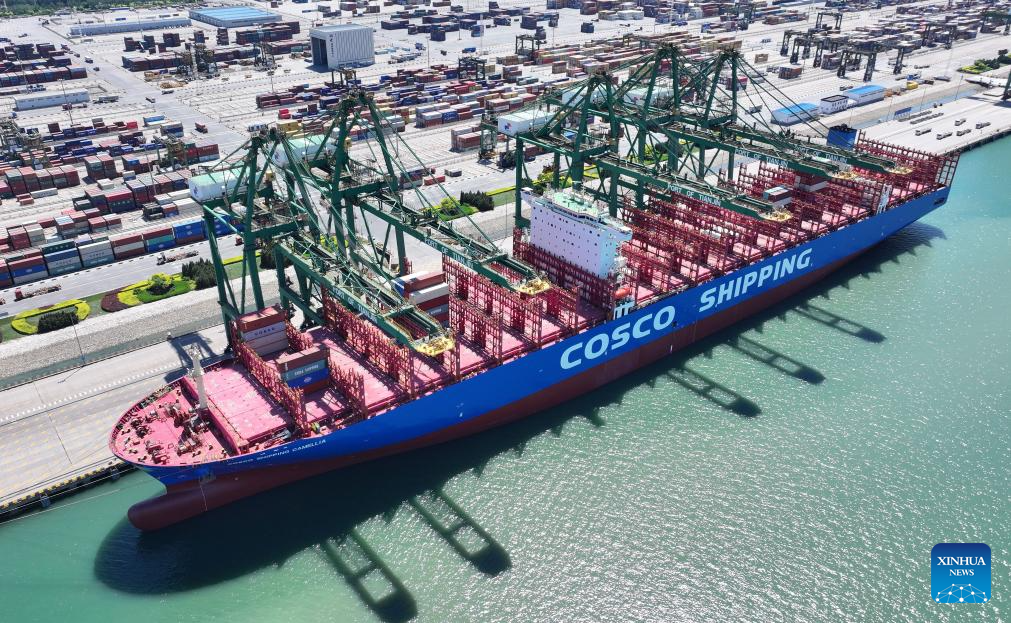
BEIJING – China will raise the additional tariffs on products imported from the United States to 125 percent, effective from Saturday, the Customs Tariff Commission of the State Council announced on Friday.
The announcement follows the US move to raise the "reciprocal tariffs" on Chinese imports to 125 percent.
The US imposition of excessively high tariffs on China seriously violates international economic and trade rules, goes against basic economic laws and common sense, and is nothing but unilateral bullying and coercion, said the commission.
The same day, a Chinese commerce ministry spokesperson said that the US should take full responsibility for its unilateral tariff measures, which have caused significant disruptions and severe turbulence in the world economy, global markets and the multilateral trading system.
READ MORE: China's commerce ministry to help exporters affected by US tariff abuse
The US move to postpone imposing high tariffs on certain trading partners under pressure from China and other parties represents only a symbolic and minimal step, and the nature of using trade coercion by the US for its own gains has not changed, added the spokesperson.
China also urged the US side to immediately correct its wrong practices and cancel all unilateral tariff measures imposed on the country.
Even if the US imposes even higher tariffs, it would no longer make economic sense and ultimately go down as a joke in world economic history, the commission said.
"Given that it's already impossible for the Chinese market to accept US imports at the current tariff level, if the United States imposes further tariffs on Chinese products, China will ignore it," the commission said.
However, should the US persist in substantially undermining China's interests, China will take firm countermeasures and fight to the end, the commission added.
"China remains open to consultations with the United States, but believes that threats and pressure are not the correct approaches to engage with China," the commerce ministry spokesperson said, urging the US to resolve differences with China through dialogue based on mutual respect.
The country has also filed a lawsuit against the US with the World Trade Organization's dispute settlement mechanism following the latest US tariff hikes.
The US tariff measures are typical unilateral bullying and coercion, representing a flagrant violation of WTO rules and severely undermining the rules-based multilateral trading system and the international economic and trade order, said a spokesperson for China’s Ministry of Commerce.
FULL TEXT: China’s Position on Some Issues Concerning China-US Economic and Trade Relations
China will firmly safeguard its legitimate rights and interests and resolutely uphold the multilateral trading system and the international economic and trade order, added the spokesperson.
China urged the US side to immediately correct its wrongdoings and cancel all unilateral tariff measures imposed on China.
‘Stop reckless actions’
If Washington truly wants to resolve issues through dialogue and negotiation, it must cease its maximum pressure tactics and reckless actions, the Chinese foreign ministry said the same day.
Speaking at a regular press briefing, ministry spokesperson Lin Jian said China has made clear its solemn position on the issue of tariffs multiple times.
"There are no winners in tariff wars or trade wars. China does not want to engage in such wars, but we are not afraid to do so."
ALSO READ: Tariffs spark economic, tech fears
Any dialogue must be on the basis of equality, mutual respect, and mutual benefit, he said. If the US insists on escalating tariff wars and trade wars, China will resolutely respond to the challenge all the way, he added.
As a responsible nation, China's countermeasures against US bullying tactics are aimed not only at safeguarding its legitimate rights and interests but also at upholding international rules and order, protecting the common interests of all countries, and defending global fairness and justice, said Lin.
"In the face of US hegemony and coercion, compromise and concession are not viable options," he added.


